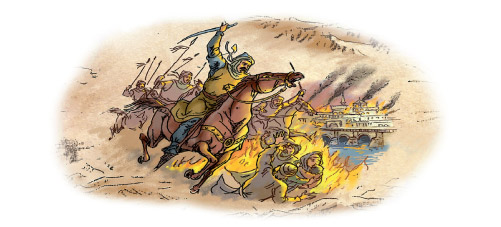10.2 THE INTOLERANCE OF THE FANATIC ALMOHABS
The Almohads, who had taken control of the Almoravids’ Maghribi and andalusian territories by 1147, far surpassed their predecessors in fundamentalist religious outlook.
They treated dhimmis (non-Muslims) very harshly. in 1146, led by Abd al-MuSmin, the almohads began their conquest of Spain. The takeover put an end to the flourishing Jewish communities of Andalusia, whose capital was Cordoba.

The practice of the Jewish religion was forbidden by the authorities. Synagogues and Yeshivot were closed, and Jews were compelled to embrace islam. Many emigrated to Christian Spain. Rabbi Abraham ibn Ezra composed a moving elegy on the demise of the Andalusian communities.
Some Jews outwardly professed Islam, but secretly observed Judaism, following a pattern that had begun under ChristianVisigothic rule early in the 7th century. (in 613, King Sisebut issued an edict calling for the conversion of all Jews on pain of expulsion. as many as 90,000 Jews “converted”, maintaining their Jewish practices and beliefs secretly. the Conversos openly returned to Judaism in later years, whenever official persecution was lifted for a while.) This practice achieved fame in Christian Spain in the 15th century.
In 1162, secret Jews were active in a revolt against the Almohads, particularly in deposing them in Granada. almohad rule in Spain lasted longer than a century. The Christians in Spain began a military campaign to retake Spanish territory which had fallen to the Muslims. This “reconquering”, called Reconquista, took several centuries, and was often the cause of brutal warfare. It was regarded as a religious war, as the native Spaniards felt they must reclaim the country for Christianity.
It was in this environment that Moshe ben Maimon (Rambam) was raised as a boy
Like the family of Moshe ben Maimon, many Jews eventually fled eastward to more tolerant Muslim lands, while most of them went northward to settle in the growing Christian Kingdoms.